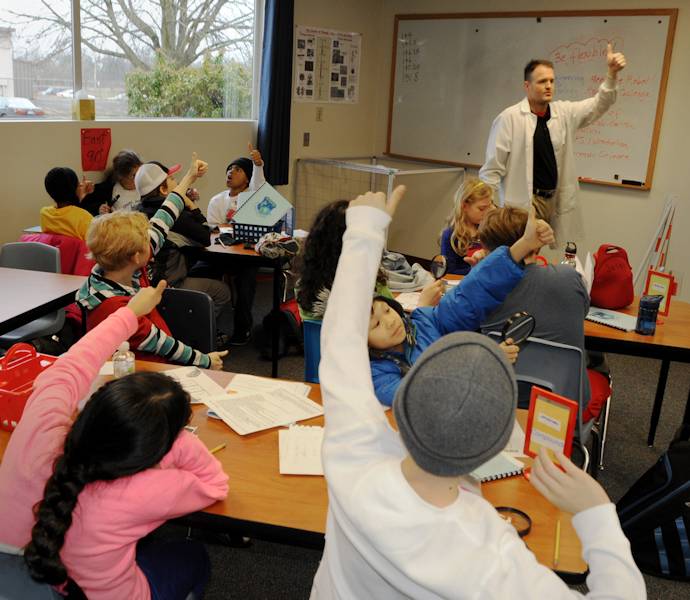|
PORTLAND AIR NATIONAL GUARD BASE, Ore. -- It's a typical group of
fifth graders; kids enthusiastically raising their hands to answer
questions from the teacher, as a few begin shouting out the answer
before called upon. Yet the situation and subject is not the normal
classroom setting with playgrounds and lunchrooms in the building.
At STARBASE Portland, the kids can see F-15 Eagles taking off from
their classroom window and program robots made from Legos.
|

Jon Dyer, a State of Oregon Forensic Scientist, gives detailed
instructions on a finger print experiment to a student group from
Chief Joseph-Ockley Green Elementary School in Portland, Ore., Dec.
16, 2013. STARBASE Academies help teach more than 75,000 students
nationally each year in math and science education. (Air National
Guard photo by Tech. Sgt. John Hughel, 142nd Fighter Wing Public
Affairs)
|
With the emphasis for science and engineering education
growing nationally, the need for this twenty-year old
program has never been more pertinent. The 25-hour STEM
(Science, Technology, Engineering and Mathematics)
curriculum is taught over five-days and is aligned with
national and state common core education standards for math
and science.
The kids at STARBASE Portland this
particular week are from Chief Joseph-Ockley Green
Elementary School in Portland, Ore. The group is working on
a chemistry experiment as they study warm and cool compound
reactions.
"This program is an amazing way to open
kid's eyes," said Molly Chun, the school's principal.
The Oregon STARBASE program has two locations, one here
at the Portland Air National Guard Base and a second program
at Kingsley Field in Klamath Falls. The two programs have
been serving more than 40 Oregon schools a year (about 2,000
fourth and fifth graders annually) since 1993.
Chun
has been an educator for over 34 years and is in her first
year as the Principal at Chief Joseph-Ockley Green. When she
discovered the STARBASE program at the Portland Air National
Guard Base she quickly saw the impact it was making with her
fifth grade students.
"The work is hands-on and is
meaningful because right away they (kids) get it. The
learning is taking them out of their normal element and
allowing them to comprehend STEM education in a fun and
meaningful way," she said.
Recent National Assessment
of Educational Progress (NAEP) scores of Oregon students
revealed that only 34 percent of fourth grade students and
35 percent of eighth graders tested above the proficient
levels in science.
The key is to engage the students
and create and interest in STEM careers and to fill the void
of qualified applicants for many Oregon companies.
"Getting kids out from behind the desk and setting 'that
hook' early in their lives for this kind of learning and
this subject is what makes this program at STARBASE so
outstanding," said Chun.
The interaction and hands-on
approach creates an atmosphere of enthusiasm not only for
the youth but for their teachers as well. As the kids engage
in experiments, their teachers also participate in the
learning.
A teacher for over 18 years, Andrew Jaquiss
who has attended STARBASE Portland countless times over the
years with his students, watches as his class engages in a
STARBASE technology lesson on robotics. This is his first
year teaching at Chief Joseph-Ockley Green.
"I love
this program, it is great because it really excites the
students," he said.
The positive approach to science
combined with five full days out of the daily classroom
while at STARBASE fosters new understandings and approaches
to learning.
"The equipment at our school does not
even begin to compare to what the kids have here at
STARBASE," said Jaquiss.
"For these kids, science has
now been turned into a fun activity."
Because the
setting of the STARBASE program is on the Portland Air
National Guard Base, students are also introduced to the
positive role models who work on the installation.
Uniformed Airmen often lead tours to showcase leading edge
technology ranging from the science of flight to the use of
robots for the removal of explosive ordinance. Seeing
technology used outside of the text book keeps the knowledge
tangible.
On the fifth and final day at STARBASE
Portland for the Chief Joseph-Ockley Green students, they
have a class in forensic science given by Jon Dyer, a State
of Oregon crime lab technician.
"Teaching science to
kids is something I really love doing," said Dyer.
He
brings in real life tools that are used in the field for the
students to use for a fingerprint testing experiment. With
over 13 years of experience in the field, he mixes in real
life stories with a high energy approach as he instructs the
group to carefully examine their own fingerprint samples.
"What do you see when you inspect the print? Do you
think that both of your thumb prints look the same?" he
asks.
"I get excited to see the kids connect not only
to science but to each other. This is a kinetic experience
and what I want the kids to know is that you don't have to
be a genius to be a scientist," said Dyer.
The work
he does is voluntary yet it allows him to learn something
new each time he gives a class at STARBASE.
"The
program is awesome and when I see kids get enthusiastic
about science that keeps me excited as a scientist," he
said.
Overall the STARBASE program promotes creative
approaches to learning. It allows students to see how
science, technology, engineering and math knowledge are used
in practical applications.
"These kids really need to
see how this kind of learning is used beyond a text book,"
said Chun.
"The real world now becomes their
classroom."
By Air National Guard Tech. Sgt. John Hughely
Provided
through DVIDS
Copyright 2014
Comment on this article |



